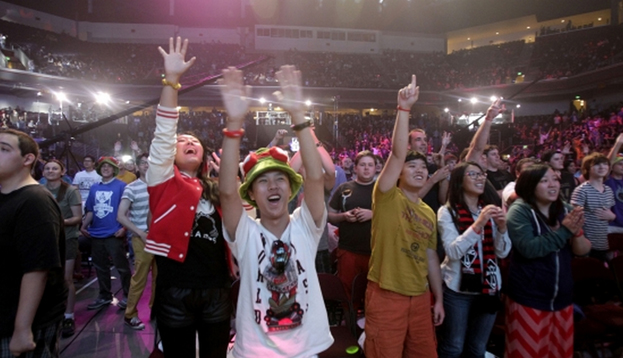Riot Games is bringing eSports to Madison Square Garden Aug. 22-23 for the League Championship Series North American Championship. It’s here at this fabled sports venue that the top players will punch their ticket for the Worlds in the hopes of making it through the weeks of competition that will end with the grand final in Berlin on Halloween. Dustin Beck, vice president of eSports at Riot Games, talks about the evolving League of Legends eSports game in this exclusive interview.

How important was eSports for League of Legends from the design stage?
The game was established to be a sport. It had a ton of things like strategic gameplay, an infinite mastery curve, required teamwork, and numerous strategies that can be used to win any match. That’s come to life as an eSport better than any of us expected. This game can be around for decades, but going into the first event in Sweden we didn’t know if people would have the appetite to watch people play online.
How have real sports impacted the League of Legends Championship Series (LCS)?
We made a concerted effort to bring storytelling and drama to the production of events. The Olympics gave us ideas on how to tell compelling stories around players because they were able to make a sport like curling seem exciting through promotional videos. We took pages out of multiple sports from European soccer for the promotion/relegation feature to the NFL and NBA with league systems. It’s been cherrypicking the best ideas from all different sports.
How has LCS improved over the years?
A lot of our advancements over the past couple of years has gone into a myriad of things like scheduling, which we made a lot simpler to understand. We bring stats to life, which is both an educational tool and an aspirational tool. We invested in shedding light on the global narrative so that when we get to Mid Season Invitational or Worlds people have a better sense of who the powerhouse teams are and who the superstar players are. We’ve also raised the quality bar on broadcast production by bringing in the best talent we could find from around the world, many coming from traditional sports and entertainment production.
How have you upped the ante for production quality?
In our early eSports days we didn’t know what the best part of the action was going to be. We almost called ESPN and asked them, but we wanted the people producing the content to be gamers. We wanted to have deep appreciation for how the game could be displayed. We were at crossroads, so we scoured the land for people who had production and broadcast expertise that were gamers and would be able to relate to our gamers. It was an arduous process, but we had to build that team of production gurus, and slowly but surely we’ve been able to do that. We’ve been building that ever since.
Can you talk about the new studios you’ve built for LCS?
The new studio in Santa Monica allows the entire team from League ops to web production to work under the same roof. This has opened up synergies and improved the workflow behind-the-scenes and has leveled us up internally. The new studio is a great setting for fans to come to. We now have a permanent home in LA and Berlin. We’ve invested in infrastructure for years to come. Both studios hold 400 people, but they sell out every week and it’s an intimate, energetic vibe. Fans get to watch teams and pro players and they get to interact with Riot. Even as recently as two years ago we didn’t have a live audience. This has added excitement to LCS.
Why did you choose Berlin for your European base?
Berlin is central to where a majority of our players are. It’s a great epicenter and accessible for many parts of Europe. Berlin is a top tourist attraction. It’s a very international city with a lot of other tech companies. Previously we were in Cologne with partner ESL, but now we do everything in-house that we wanted to do.
How have you blended entertainment with gaming at big events like the Finals?
Our big shows have an element of spectacle to them. We need to have a lens of what our players will appreciate. We wouldn’t just throw some musical act onto the stage. Imagine Dragons last year was a great collaborating partner. We were playing League with them. They can relate to the audience. They had more fun watching the gamers play. Finding acts like that is harder, but it transcends the sport and identifies with core gamers.
Can you talk about the new All Star Game at all?
With MSI we wanted a tournament focused on a glimpse of what to expect from Worlds, and a way to stack up regions when pitted against each other. It’s a great celebration of worlds from across the various leagues. The All Star Game has a pretty new, fun, and irreverent tone. It’s designed to be completely focused on the fan experience and what they want to see. We plan on having a new level of interaction to have some decision-making from fans of what that format and tournament will look like. It will remain competitive as it’s always been, but there’s going to be an element of irreverence. We have a unique position where we have the most tech-savvy, engaged fans and we want to take advantage of that. A good analogy would be the NBA All Star Game, where there’s an East vs. West game but also Skills Competition like slam dunks and three-point competition. The All Star Game will take place after the season wraps. It was taking away from what the season is when it was in the middle of it.
How has the Challenger Series evolved?
There’s a lot of work still to be done, but the early returns have been exciting. When teams graduate to LCS they’re much more mature organizations and easier for the league to absorb and in a better structural situation to hit the ground running.
What role do you see the college circuit playing for LCS moving forward?
It’s unclear how competitive the college circuit will get, but so many of our players reside in college or in Masters programs and have a strong network of friends to play with socially. We want to take advantage of that. It can be an exciting form of competition. Collegiate might foster the next teams that could qualify into the Challenger league.
What do you think of two schools now offering scholarships for eSports?
We don’t know if it’s an exception or a trend. We’ll see how it pans out. It’s fun to see League players rewarded.
What are your thoughts on Fantasy eSports and gambling?
It’s interesting to see how much focus has been on the fantasy sites. Fantasy eSports is a fun activity for a lot of people and engages them at a more deep and intimate level. It’s gamifying the game. Sites that you can have that experience and not even have to gamble money adds a more fun experience in a competitive manner.

